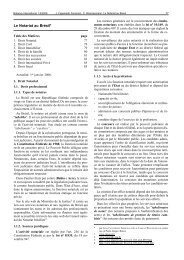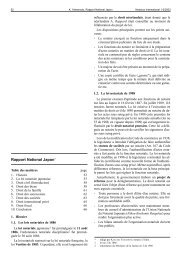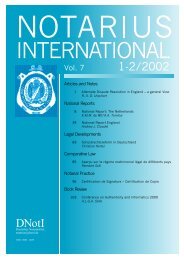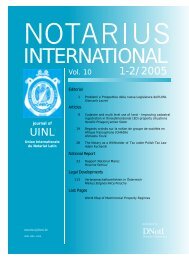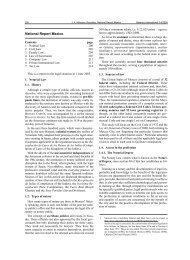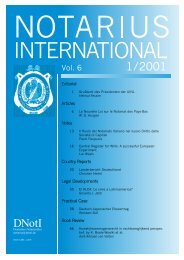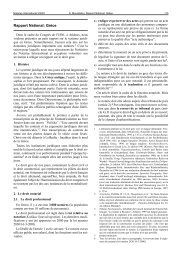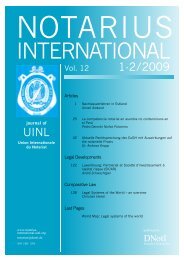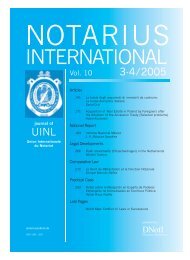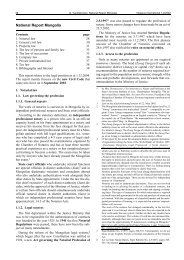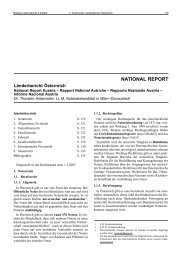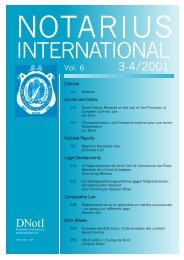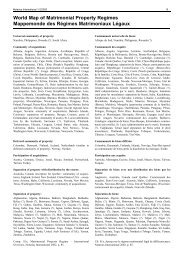ARTICLES and NOTES - Notarius International
ARTICLES and NOTES - Notarius International
ARTICLES and NOTES - Notarius International
Create successful ePaper yourself
Turn your PDF publications into a flip-book with our unique Google optimized e-Paper software.
202 F. Tassinari, Reform of the limited liability company in Italy <strong>Notarius</strong> <strong>International</strong> 3-4/2002<br />
that have to be fulfilled (Deed of Formation, amendment<br />
of the Deed of Formation, transfer of quotas, extraordinary<br />
operations etc.) <strong>and</strong> of the rules of governance (distinction<br />
between decisions of the members <strong>and</strong> of the directors,<br />
the majority principle in decision-making, the<br />
free transferability of quotas by inter vivos deed <strong>and</strong> on<br />
death etc.).<br />
In summary therefore, all the main innovations that<br />
have been introduced require specific choice in the exercise<br />
of private autonomy (direct attribution of management<br />
of the business to the members, non-collegiate decisions<br />
of members <strong>and</strong> directors, rules of administration<br />
of separate or joint type, the use of the new concepts of<br />
agreed withdrawal of exclusion of member by just cause,<br />
membership on the basis of work provided etc.) with the<br />
consequential transaction costs for members interested in<br />
such provisions.<br />
In addition, the legislature considered it necessary to<br />
include a number of m<strong>and</strong>atory provisions in the new<br />
law governing the S.r.l. protecting interests deemed to be<br />
functional either to achieving its legislative policy objectives<br />
of „promoting the type“, or in ensuring propriety in<br />
the conduct of business activities leaving aside the fact<br />
that the first aims do not always seem to be easy to reconcile<br />
with the second.<br />
This has happened in particular, not only with reference<br />
to the protection of special interests (e.g. the m<strong>and</strong>atory<br />
rules governing the withdrawal of a member drawn in decidedly<br />
wider terms than the preceding provisions, the<br />
rules for the payment of departing members drawn in<br />
more rigid terms <strong>and</strong> again, providing greater guarantee<br />
to the member concerned, the member’s right of information,<br />
the right to hold the Directors liable etc.) but also<br />
with reference to the protection of external interests (direct<br />
liability in some cases, of the member him or herself,<br />
almost as if to breathe new life into the historical name<br />
„limited liability company“ <strong>and</strong> the widespread use of the<br />
concept of opposition by the creditors). Again there is<br />
concern for the protection of interests that can be defined<br />
as general in nature (e.g. deferral of financing from<br />
members in situations where the company is in financial<br />
difficulties). Indeed, this is such a marked characteristic<br />
that there has been talk in the academic literature of „poisoned<br />
pills“ dropped into the reform plate. It may indeed,<br />
have the effect of stimulating a migration from S.r.l. to<br />
S.p.A. in the form of a flight from the former type rather<br />
than a positive choice of the latter.<br />
4. Conclusion: Private autonomy as "Leitmotiv" of<br />
the reform of the Italian S.r.l.<br />
From the above reflections <strong>and</strong> in summary, the „new“<br />
S.r.l. would seem a little less „new“ with respect to the<br />
earlier version than the comparison of normative provisions<br />
<strong>and</strong> the emphasis of a number of declarations of<br />
principle expressed during the preparatory works <strong>and</strong> in<br />
the academic literature might have lead us to believe. It<br />
seems, more than anything else, to represent an acceptance<br />
of the interpretation based on the typological<br />
method introduced by doctrinal teaching <strong>and</strong> described<br />
in the preceding section, as the authentic interpretative<br />
method. In effect this means the transposition of the hermeneutic<br />
plane to the legislative plane with the undoubted<br />
benefits flowing from such an approach in terms of<br />
certainty of the law, <strong>and</strong> of the idea of flexibility <strong>and</strong> excludability<br />
characteristic of the entire structure under<br />
consideration.<br />
In a word therefore, it seems to represent a long-overdue<br />
up-dating of the legislation after more than sixty years.<br />
We are bound to add though, it also seems that such<br />
transposition introduced by the reform, has a sting in the<br />
tail justifiable in the light of a number of traditional convictions<br />
(drawn particularly from the literature) developed<br />
in a cultural context where the wide ranging use of<br />
m<strong>and</strong>atory provisions is seen with favour – e.g. the extensive<br />
use of inderogable withdrawal, strong emphasis on<br />
the procedures for attaching liability to the directors <strong>and</strong>,<br />
with the reform, on the members as well, etc. This is some<br />
way from the efficiency-based, economic concept which<br />
had rightly been chosen as the banner of the reform 26 .<br />
The objectives of the reform of the S.r.l. were thus dual<br />
in nature.<br />
Obviously, the time will come when it will be possible<br />
to demonstrate whether these two elements referred to<br />
above can be brought together in a rational <strong>and</strong> effective<br />
manner. It will then above all, be possible to see whether<br />
the decisions made by the legislature are popular with the<br />
operators in the field, permitting, in whole or in part, the<br />
pursuit of the legislative policy mentioned above.<br />
We must also wait to see, in the absence of clear commitment<br />
by the legislature, the extent to which the new<br />
S.r.l., undoubtedly distanced from the S.p.A., has in reality<br />
come closer to the personal company.<br />
For the moment though, it appears possible to reach a<br />
preliminary conclusion. The undoubtedly innovative<br />
character <strong>and</strong> significance of the opening proposed by<br />
legislature towards private autonomy has thrown down<br />
an important challenge to theorists <strong>and</strong> operators alike.<br />
This challenge must be met in the knowledge that a proper<br />
evaluation of the new form of S.r.l. can only be effected<br />
if the interpreter is able to free him or herself from the<br />
inertia deriving from the knowledge of the long application<br />
of the old laws <strong>and</strong> old principles (e.g. equality of<br />
treatment of the members, the bar against the member<br />
taking on obligations other than the conferral of money or<br />
money’s worth or possible accessory services etc.). They<br />
must be prepared to experiment with new solutions leading<br />
to the necessary consequences of that opening towards<br />
private autonomy which undoubtedly represents<br />
the Leitmotiv of the reform of the S.r.l. in Italy.<br />
26 What has been noted in the text must obviously be seen merely as<br />
such. It is not intended in any way to be a "premature" negative judgment<br />
of the reform. Indeed, the decision to introduce a number of<br />
specific, almost compulsory, m<strong>and</strong>atory provisions which did not appear<br />
in the previous legislation, may well prove to have been justifiable<br />
if it leads to the elimination of the deplorable approach (of which<br />
not only case law but also academic literature <strong>and</strong> the operators themselves<br />
have been guilty) described in the words of an eminent commentator<br />
as that of "postulating a clamour of inderogable rules in the<br />
defence of the most evanescent <strong>and</strong> imagined general interests." (F.<br />
d'Alless<strong>and</strong>ro, Il diritto pretorio delle società a mezzo secolo dal codice<br />
civile, in Diritto giurisprudenziale, edited by M. Bessone, Turin,<br />
1996, p. 237)



